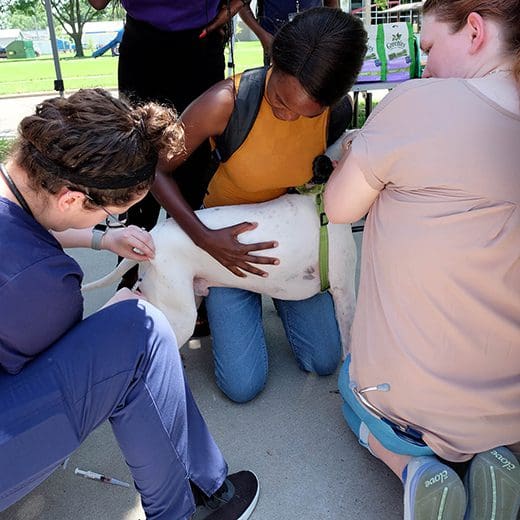Manhattan, KS— A Kansas State University veterinarian says immunizations are a great step to ensure pets live a happy, healthy life.
“Vaccinations can help extend the life of your pet by protecting them from many diseases,” said Susan Nelson, clinical professor at the university’s Veterinary Health Center. “Immunizations are also much less expensive than having to treat these serious diseases and, in many cases, can prevent pets from dying.”
Vaccines help the immune system defend against specific diseases through antibody development. The antibodies search for and destroy the disease-producing organisms in the body that they were designed to defend against. Dogs and cats have two categories of vaccines: core and non-core vaccines.
According to Nelson, every cat and dog should receive core vaccines as the diseases they protect against cause serious illness or death, and are common not only where the pet lives, but also worldwide. Core vaccines prevent common diseases like rabies, distemper, parvovirus and hepatitis in dogs and rabies, herpesvirus, calicivirus and panleukopenia in cats.
Non-core diseases can also cause serious illnesses, but are based on the geographic area where the pet lives and its lifestyle, including if it goes outdoors, if it will be boarded, or have contact with wildlife. Examples include bordetella, or kennel cough, Lyme disease and canine influenza in dogs and feline leukemia for cats. Nelson advises owners to work with a veterinarian to develop an appropriate vaccine protocol for individual pets based on their lifestyle.
“Pets can get many diseases from wildlife, including rabies, parvo and distemper, and vaccinations can help keep them protected against these,” Nelson said. “Vaccinations help protect your pet from diseases it can get from other animals, and they can also help protect people from some diseases pets can transmit to humans. While some vaccines may not keep your pet from getting ill, they can greatly reduce their chances of developing severe disease.”
Nelson recommends that puppies and kittens receive a series of core vaccines every three to four weeks, starting at 6-8 weeks of age and ending between 16-18 weeks of age. Older dogs and cats need some annually, while others may be needed every few years. Some vaccines also need a series of boosters to give complete protection before their frequency can be reduced. An incomplete series can leave pets vulnerable to infections.
For some diseases, the level of antibodies, or titers, in the blood can be measured in lieu of vaccination. Nelson cautions that for many diseases, antibody measurement is not an option.
“There are some diseases for which research shows that an appropriate level of measured antibodies is indicative of protection from that disease; but for many, we do not yet have those answers,” Nelson said. “Your veterinarian can discuss which diseases may be measured through titers in lieu of vaccination and how often these titers should be checked.”
Nelson says most pets have minimal to no side effects from vaccines. Similar to humans, typical reactions to immunization in dogs and cats include 24-48 hours of low-grade fever, mild pain at the injection site, swelling at the injection site, lethargy, mild diarrhea or a single episode of vomiting. Contact a veterinarian if your pet experiences more severe symptoms.
“For the vast majority of pets, the benefits of vaccines greatly outweigh their risks,” Nelson said. “Life-threatening adverse vaccine events are rare. If your pet is one of the few that has had a severe reaction, or you are worried your pet may have one, some steps can be taken to help minimize the chance of this happening. Speak with your veterinarian about these options instead of avoiding vaccinations altogether.”













